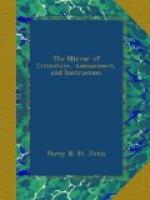It is impossible to view some members of the despised class without sorrow and pity, particularly those who are attached, in the lowest offices, to the establishments of the Europeans. They are the most melancholy race of beings, always alone, and apparently unhappy: they are scouted from the presence even of their fellow-servants. None but the mind of a poet could imagine such outcasts venturing to raise their thoughts to the beauty of a Brahmin’s daughter; and a touching tale in such creative fancy, no doubt, it would make, for, from their outward appearances, I do not perceive why they should not be endowed with minds as sensitive at least as those of the castes above them. There are among them some very stout and handsome men; and it is ridiculous to see sometimes all their strength devoted to the charge of a sickly puppy;—to take care of dogs being their principal occupation!
Our attention has been drawn to the above passage in Captain Skinner’s work, by its ready illustration of the views and conclusions of the late Dr. Knox, in his invaluable Spirit of Despotism, Section 2, “Oriental manners, and the ideas imbibed in youth, both in the East and West Indies, favourable to the spirit of despotism.” How forcibly applicable, on the present occasion, is the following extract:—“from the intercourse of England with the East and West Indies, it is to be feared that something of a more servile spirit has been derived than was known among those who established the free constitutions of Europe, and than would have been adopted, or patiently borne, in ages of virtuous simplicity. A very numerous part of our countrymen spend their most susceptible age in those countries, where despotic manners remarkably prevail. They are themselves, when invested with office, treated by the natives with an idolatrous degree of reverence, which teaches them to expect a similar submission to their will, on their return to their own country. They have been accustomed to look up to personages greatly their superiors in rank and riches, with awe; and to look down on their inferiors in property with supreme contempt, as slaves of their will and ministers of their luxury. Equal laws and equal liberty at home appear to them saucy claims of the poor and the vulgar, which tend to divest riches of one of the greatest charms, over-bearing dominion. We do, indeed, import gorgeous silks and luscious sweets from the Indies, but we import, at the same time, the spirit of despotism, which adds deformity to the purple robe, and bitterness to the honied beverage.” “That Oriental manners are unfavourable to liberty, is, I believe, universally conceded. The natives of the East Indies entertain not the idea of independence. They treat the Europeans, who go among them to acquire their riches, with a respect similar to the abject submission which they pay to their native despots. Young men, who in England scarcely possessed the rank of the gentry, are waited




